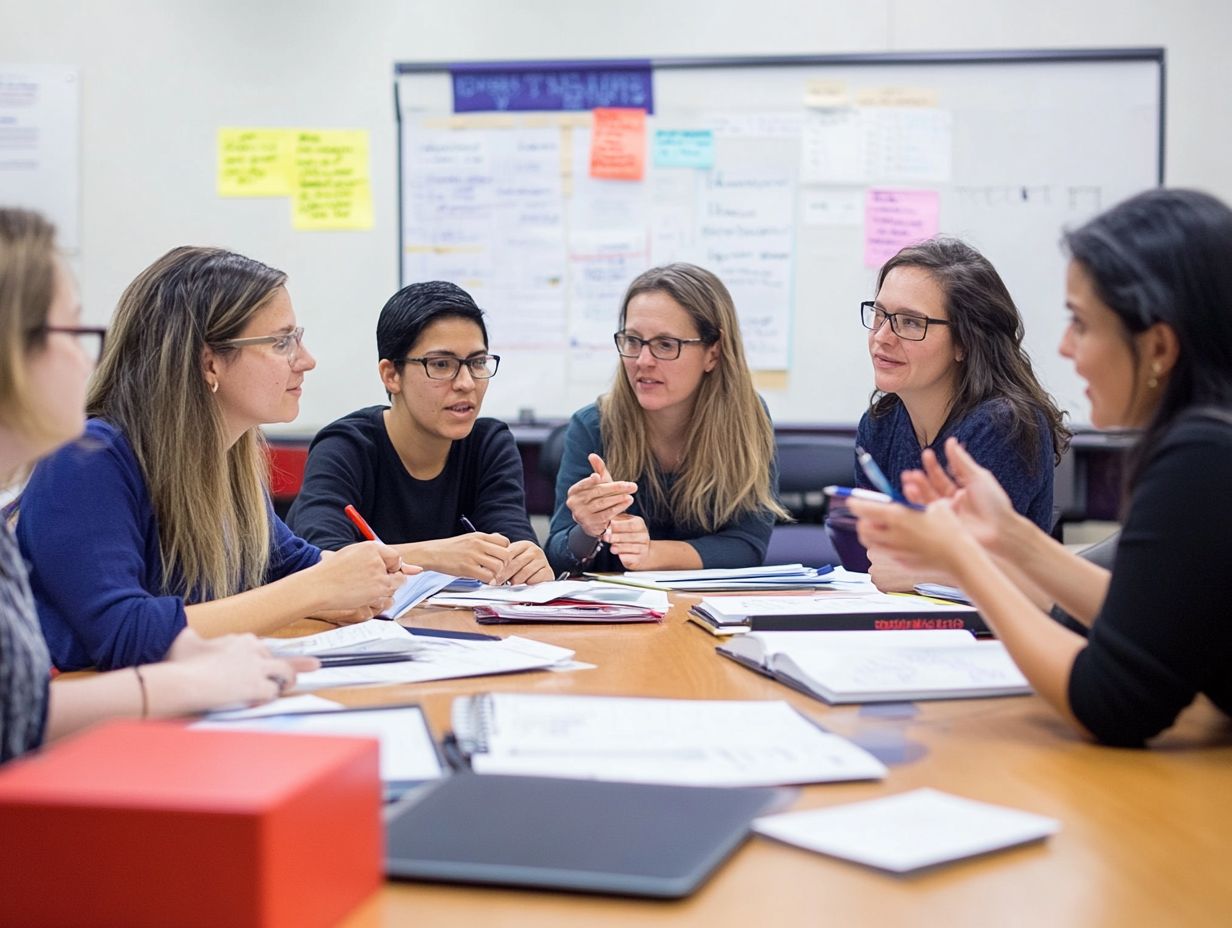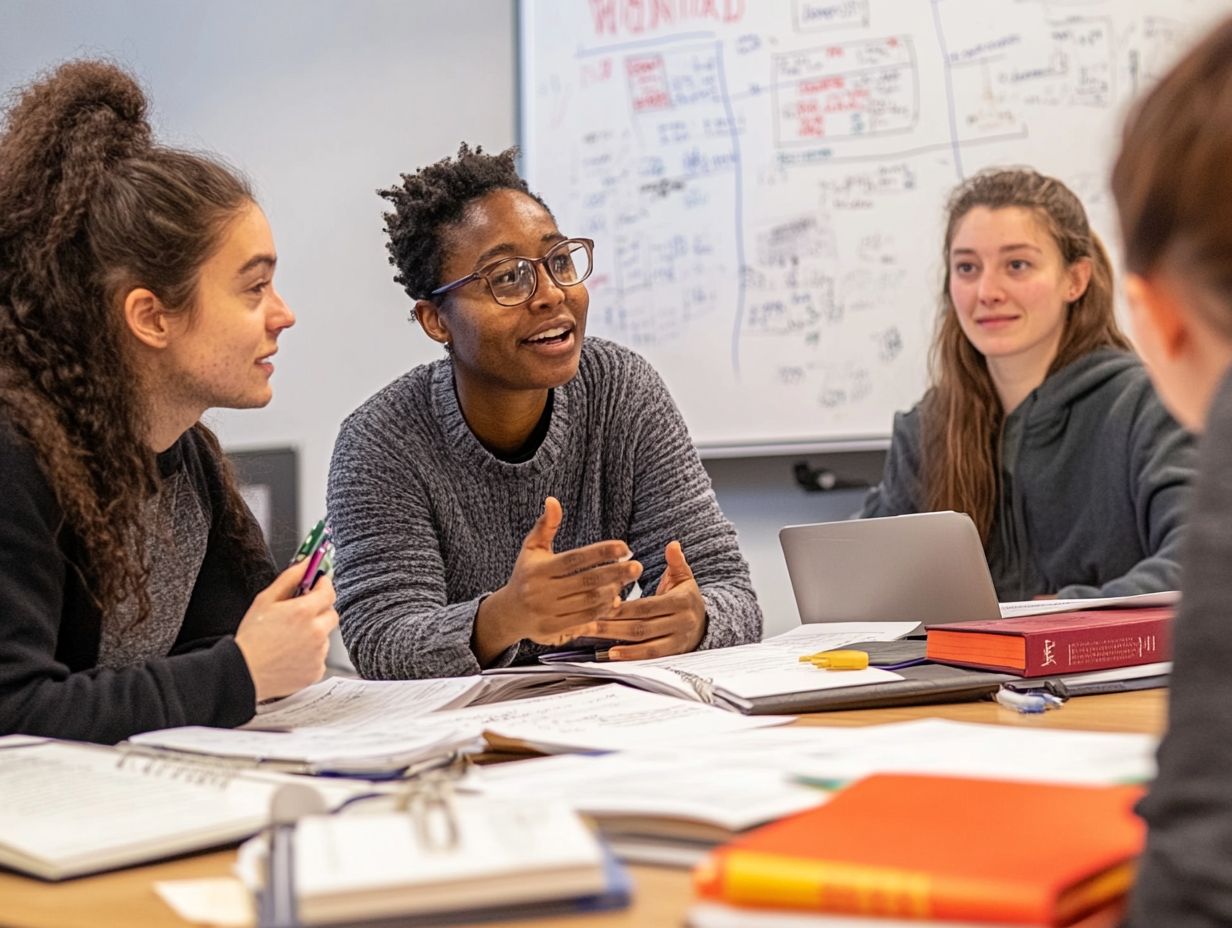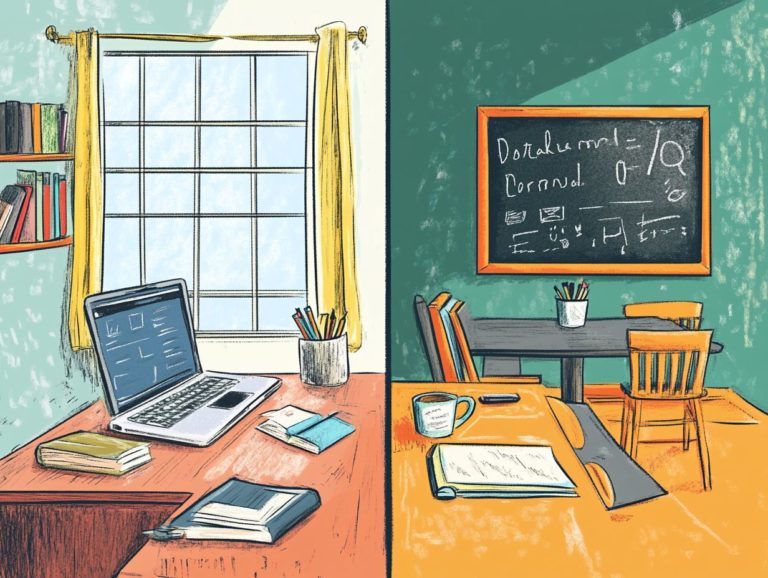The Importance of Peer Feedback in Doctoral Studies
Navigating the complexities of doctoral studies can often feel isolating. Yet, peer feedback emerges as a pivotal tool in your journey. Engaging with fellow scholars not only enhances your research and writing skills but also cultivates a sense of community among students.
Let’s explore the many benefits of peer feedback together, offering strategies for both giving and receiving helpful feedback that points out both strengths and weaknesses while addressing common challenges.
Discover how fostering a culture of feedback can transform your doctoral experience and significantly contribute to your personal growth.
Contents
- Key Takeaways:
- The Role of Peer Feedback in Doctoral Studies
- Benefits of Peer Feedback
- Effective Strategies for Giving and Receiving Peer Feedback
- Challenges and Solutions for Implementing Peer Feedback in Doctoral Studies
- Frequently Asked Questions
- What is the importance of peer feedback in doctoral studies?
- How does peer feedback benefit doctoral students?
- Can peer feedback replace feedback from professors and advisors?
- What are some best practices for giving and receiving peer feedback?
- How can peer feedback be incorporated into doctoral programs?
- What are the potential challenges of using peer feedback in doctoral studies?
Key Takeaways:

- Peer feedback strengthens research and writing skills.
- It builds a supportive community among scholars.
- Strategies for effective feedback include clear communication and openness to critique.
- Overcome barriers by fostering a positive feedback culture.
The Role of Peer Feedback in Doctoral Studies
Peer feedback is essential in your academic journey as a doctoral researcher. It significantly enhances the quality of your work while shaping your development as an emerging scholar.
It creates an environment where helpful feedback is highly valued. This enables you to refine your writing skills and work through the challenging publication process with greater ease.
This dynamic fosters a collaborative atmosphere that enhances your feedback experience and contributes to the wider academic dialogue. It ensures that due recognition is given to those who actively engage in the peer review process.
Why Peer Feedback is Important
You need to understand why peer feedback matters, whether you’re a doctoral researcher or an early career academic. It plays a vital role in enhancing your writing standards.
Constructive feedback offers you valuable insights, helping you recognize your strengths while also identifying areas ripe for improvement. Engaging in the process of reviewing each other’s work sharpens your critical thinking skills and cultivates a collaborative atmosphere where innovative ideas can thrive.
This exchange of perspectives ultimately elevates your writing standards and enhances clarity in your communication. For those of you aiming for publication, robust feedback can refine your work to align better with the expectations of journals and reviewers.
This can increase your chances of acceptance and ensure that your research reaches a wider audience. In essence, peer evaluation becomes an essential tool on your academic writing journey.
Benefits of Peer Feedback
The benefits of peer feedback go far beyond just individual improvement. They cultivate a supportive community among doctoral researchers and early career scholars.
This collaborative environment not only enhances your writing skills but also helps you effectively manage your academic workload.
Improving Research and Writing Skills

Improving your research and writing skills through peer feedback is truly invaluable. This practice allows you to refine your academic writing while simultaneously enhancing your personal development.
Engaging in this collaborative process fosters a sense of community among scholars and encourages critical thinking and self-reflection. When you exchange insights on drafts, you dive deeper into your argument structures, resulting in greater clarity and coherence in your writing.
Receiving constructive criticism helps you pinpoint gaps in your methodologies or literature reviews, prompting a more thorough exploration of your topics. These interactions make your feedback experience much richer, ultimately cultivating stronger analytical skills that will serve you well throughout your entire academic journey.
Building a Supportive Community
Building a supportive community through peer feedback creates an environment where you, as a doctoral researcher, feel encouraged to engage in peer assessment and collaborative learning.
In such an ecosystem, you enhance your understanding of diverse perspectives and share the burden of managing your academic workload. By exchanging constructive critiques, you foster a sense of belonging and mutual respect, vital for personal and professional growth.
This teamwork boosts your academic quality and recognizes the invaluable contributions of your peers who provide insightful feedback. Acknowledging those who share their insights reinforces the importance of active participation, enriching the community and nurturing a culture of continuous improvement.
Effective Strategies for Giving and Receiving Peer Feedback
Implementing effective strategies for giving and receiving peer feedback is essential for elevating your overall feedback experience as a doctoral researcher.
This approach guides you in offering constructive criticism and enhances your academic writing skills, especially when writing manuscripts.
Tips for Providing Constructive Criticism
Providing constructive criticism in peer feedback is an essential skill that can significantly enhance your academic writing and contribute to effective performance evaluation.
By balancing honest insights with supportive language, you create an environment where writers feel inspired to refine their work. This approach boosts confidence and enriches the learning experience, making it vital for collaboration in academia.
When you establish clear, actionable suggestions instead of vague remarks, your feedback becomes relevant and valuable. Highlighting strengths can motivate your peers to strive for excellence, nurturing a culture of growth.
Engaged and thoughtful feedback is crucial for honing the skills necessary for effective scholarly communication.
How to Use Feedback for Personal Growth

Using feedback to grow personally is essential for doctoral researchers, transforming peer feedback into rich opportunities for reflective learning and development.
By systematically engaging with input from mentors and colleagues, you identify your strengths and areas for improvement, cultivating a culture of continuous learning.
Integrating reflective practices allows you to analyze your performance critically, guiding you in setting actionable goals that align with your academic pursuits.
Training support plays a pivotal role in your journey. Workshops and peer coaching sessions offer valuable frameworks and strategies for interpreting feedback effectively.
This holistic approach cultivates resilience and enhances your overall research capabilities, leading to greater confidence and competence in your scholarly endeavors.
Challenges and Solutions for Implementing Peer Feedback in Doctoral Studies
Implementing peer feedback in doctoral studies can pose various challenges that require careful consideration to maximize its effectiveness, especially in demanding fields like medical education, where the academic workload is substantial.
It’s essential to tackle these challenges head-on to truly benefit from peer feedback!
Overcoming Barriers to Effective Feedback
Overcoming barriers to effective feedback is crucial for ensuring that peer assessment remains valuable in academic dialogue, fostering recognition for both authors and reviewers.
Several obstacles often impede this process, such as a lack of clear guidelines and insufficient training for assessors. This may result in vague or unconstructive critiques that fail to promote meaningful improvement.
Time constraints can also hinder thorough evaluations, prompting reviewers to rush through their comments. To tackle these challenges, institutions can implement structured frameworks and offer workshops focusing on peer assessment techniques.
By encouraging a culture of open communication and constructive criticism, a more supportive environment can be created, allowing authors to gain valuable insights that will enhance their work.
Join a workshop today to enhance your peer feedback skills!
Creating a Positive Feedback Culture
A positive feedback culture fosters collaborative learning. It helps everyone approach peer evaluation with an open mind.
By nurturing an environment where open communication flourishes, you can share thoughts and reflections. This leads to richer interactions and a deeper understanding.
Incorporating regular check-ins and structured feedback sessions enhances this culture. It promotes a sense of belonging and shared responsibility among all learners.
Engaging in discussions where qualitative insights are valued facilitates constructive dialogue. It encourages you to view feedback as a tool for growth rather than mere criticism.
This approach changes education, reinforcing the idea that learning is a collective journey. Your contributions, along with those of your peers, are pivotal.
Frequently Asked Questions

What is the importance of peer feedback in doctoral studies?
Peer feedback is crucial in doctoral studies as it allows students to receive constructive criticism and valuable insights from their peers. This helps them improve their research and writing skills.
How does peer feedback benefit doctoral students?
Peer feedback helps doctoral students develop critical thinking skills, gain new perspectives, and identify weaknesses in their research. This leads to a stronger and more comprehensive thesis or dissertation.
Can peer feedback replace feedback from professors and advisors?
No, peer feedback should complement the feedback given by professors and advisors. While peers can offer different perspectives, it is ultimately the responsibility of professors and advisors to guide and evaluate the student’s work.
What are some best practices for giving and receiving peer feedback?
When giving feedback, be specific, constructive, and respectful. Listen carefully when receiving feedback, and be open to suggestions for improvement.
How can peer feedback be incorporated into doctoral programs?
Peer feedback can be incorporated into doctoral programs through various methods such as peer review workshops, group discussions, and online forums. Establish clear guidelines to make peer feedback effective!
What are the potential challenges of using peer feedback in doctoral studies?
Some potential challenges may include a lack of expertise among peers, potential bias, and difficulty in managing the process. However, these challenges can be addressed through proper training, guidelines, and supervision.






